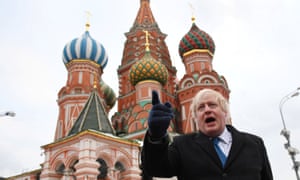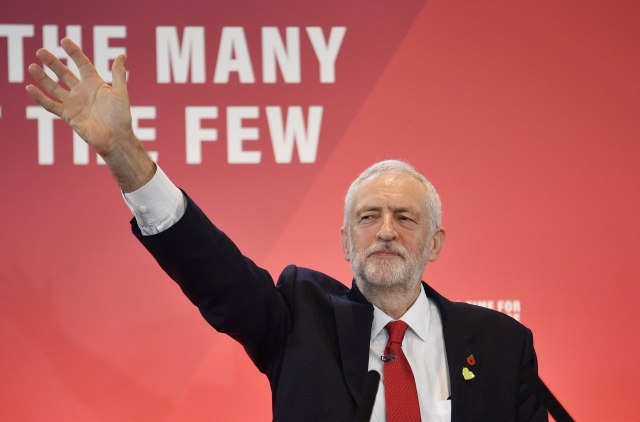The Tories rely on Russian money – that’s why they ignore Russian meddling
If the intelligence report on this matter is not made public, voters can only conclude the party has something to hide
• Chris Bryant
Chris Bryant is a former chair of the parliamentary group on Russia
Wed 13 Nov 2019 18.30 GMT Last modified on Thu 14 Nov 2019 12.50 GMT

‘Boris Johnson admitted that the biggest mistake he made as foreign secretary was his visit to Moscow, and thinking it was possible to reset relations.’ Johnson in Red Square, December 2017. Photograph: Stefan Rousseau/Reuters
Anyone who really wants to understand the government’s determination to suppress parliament’s intelligence and security committee report on Russia needs to go back to 2009. I was the Europe minister and my opposite number, Mark Francois, made it abundantly clear that a future Tory government intended to “normalise” relations with Vladimir Putin’s Russia. So when David Cameron arrived in Downing Street he wiped the slate clean.
Russia was one of the world’s major fast-growing economies. We needed to do more trade with Putin and let bygones be bygones.
That required quite a lot of wilful amnesia by Conservative ministers.
Alexander Litvinenko had been poisoned with polonium in the UK in 2006. All the evidence pointed to the Kremlin, but as then home secretary Theresa May stated quite openly, the reason she was blocking an inquiry into his murder was that it would harm diplomatic relations. Likewise,
Sergei Magnitsky died in a Russian jail in 2009 after he discovered massive corruption by Kremlin officials while working for a British firm. But time and again when I asked Cameron and May whether they would bar anyone associated with his murder from entering the UK, they obfuscated and prevaricated.
So began the massive influx of Russian money into the UK. Oligarchs squirrelled their money away here and dramatically inflated the housing market in the process. Tier 1 “golden” visas were handed out like confetti to dubious characters on the sole understanding that they had £2m “available” to invest in the UK – even if they never actually invested a rouble here.
One investment was commonplace, though –
in the Conservative party. Sometimes it was the oligarch himself – as with Alexander Temerko, who had previously had a prominent role in the Russian arms industry. Sometimes it was the oligarch’s naturalised wife – as with Lubov Chernukhin, whose husband was Putin’s deputy finance minister. A payment of £160,000 granted her
a tennis match with Cameron and Johnson. In all, Russian money has dripped into the
Tory party to the tune of at least £3.5m since Cameron came to power – with at least £500,000 in the past year alone.
It is time Boris Johnson woke up to the fact that Russia is intent on undermining our political system
No wonder the government is determined to block publication of the intelligence committee report. You have to listen very carefully to what successive Conservative ministers have said. They never deny that Russia has attempted to interfere with our democracy. What they say repeatedly is that there have been no “successful” attempts. The implication is clear. But leaving aside the question of what constitutes “success”, the British people surely deserve to know what those attempts look like. Voters need to go into this general election with their eyes wide open.
The truth is, Putin believes he is at war with the west. That doesn’t involve tanks or missiles, but a highly effective manipulation of our democratic system. His
bot and troll factory in St Petersburg targets individual British politicians and groups that are especially critical of Putin, running specially generated negative tweets and Facebook material and magnifying attack material put out by others. The aim is simple – destabilise and undermine all Putin critics with as little comeback as possible.
He also runs a systematic campaign of obfuscation and misinformation on everything from the attack in Salisbury, relations with the US, the political situation in Ukraine, and the bringing down of the Malaysia Airlines flight MH17. Often the inconsistencies in the Russian line seem preposterously careless, but they simply underline the disdain in which Putin’s spokespeople hold western concepts of the rule of law.
The news that the Labour party has
suffered multiple attempts at cyberattacks this week will not be a surprise in the parliamentary IT department, as they have regularly warned the Commons finance committee of repeated attempts to penetrate the Commons IT systems from Russia and China. And sometimes the Russians go further. I gather the food poisoning and the repeated phone calls to my hotel room every hour through the night on a ministerial visit to Nizhniy Novgorod were standard irritants meted out by the FSB to “difficult” visitors. When the Russian government complained that I, while chair of the all-party parliamentary group on Russia, was too critical of Putin (and too homosexual), Conservatives worked directly with the Russian embassy to have me removed.
Sergey Nalobin organised the lavish launch of the
Conservative Friends of Russia group at the embassy in 2012, and a few months later half the then cabinet and more than 150 Conservative MPs turned up at the AGM to vote me out. Evidence recently provided to the foreign affairs select committee inquiry on autocracies claims that this was directly sanctioned by the Kremlin’s foreign intelligence agency, the SVR.
Boris Johnson admitted that the
biggest mistake he made as foreign secretary was his visit to Moscow, and thinking it was possible to reset relations. It is time he woke up to the fact that Russia is intent on undermining our political system. He should come clean now and publish the intelligence committee report. It’s the only way he can counter the Russian influence that clearly hangs over him and his party. At best, successive Conservative prime ministers have been naive about Putin. If Johnson continues to refuse to publish, though, the only conclusion will be that he is complicit and has something to hide.
• This article was updated on 14 November to clarify Alexander Temerko’s position.






